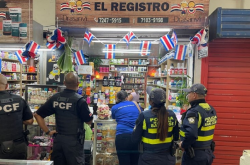NUREMBERG, Germany – The impacts of Altcoins, an alternative to Bitcoins, on law enforcement investigations and prosecutions was the focus of the second meeting of the INTERPOL Working Group on Darknet and Cryptocurrencies.
With more than 2,000 different cryptocurrencies in existence, the Working Group had previously identified Altcoins as an emerging challenge for police investigations worldwide.
Co-hosted by INTERPOL and the Bavarian State Ministry of Justice (Germany), the meeting brought together 52 participants from law enforcement, academia, private industry and international organizations in 25 countries.
The Working Group identified specific Altcoins which should be considered a priority, the most effective current investigative solutions, information sharing on the criminal use of Altcoins, and how to translate the complex technical details related to Altcoins into usable information for police and prosecutors.
During the two-day (10 and 11 October) meeting, the participants conducted an empirical study outlining the necessary steps for investigating crimes involving cryptocurrencies, and produced a report on the most significant Altcoins for law enforcement and their tracing capabilities. The aim is to ultimately develop a common investigative methodology to assist police in counteracting the criminal activities facilitate by the anonymous cryptocurrencies.
Bavarian State Minister of Justice, Winfried Bausback, said: “Cryptocurrencies give perpetrators the possibility to conceal their cash flows and identities across country borders, enabling them to elude law enforcement authorities. We can only confront the global cryptocurrency phenomenon by intensifying the international cooperation of powerful investigative structures.”
Thomas Janovsky, Public Prosecutor General in Bamberg in charge of the Bavarian Central Office for the Prosecution of Cybercrime, noted the need for police and the judiciary alike to step up to these new challenges.
“Privacy oriented cryptocurrencies like Monero or Z-Cash might take over at least some of the market share of the Bitcoin within the criminal environment. Police experts, but also prosecutors as well as judges, must adapt to this new reality soon. We all need to get ahead of technological trends to successfully fight against the criminal use of cryptocurrencies,” said Mr Janovsky.
The first Working Group meeting, held in Singapore in March, looked at emerging threats including Darknet markets, cryptocurrency mixers, anonymization techniques, lack of Altcoin tracing tools and decentralized escrow services.








